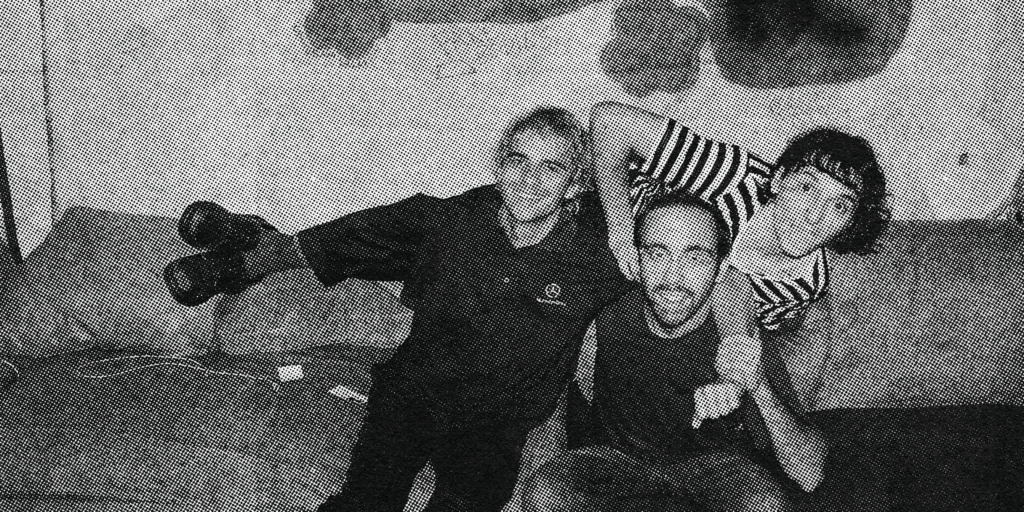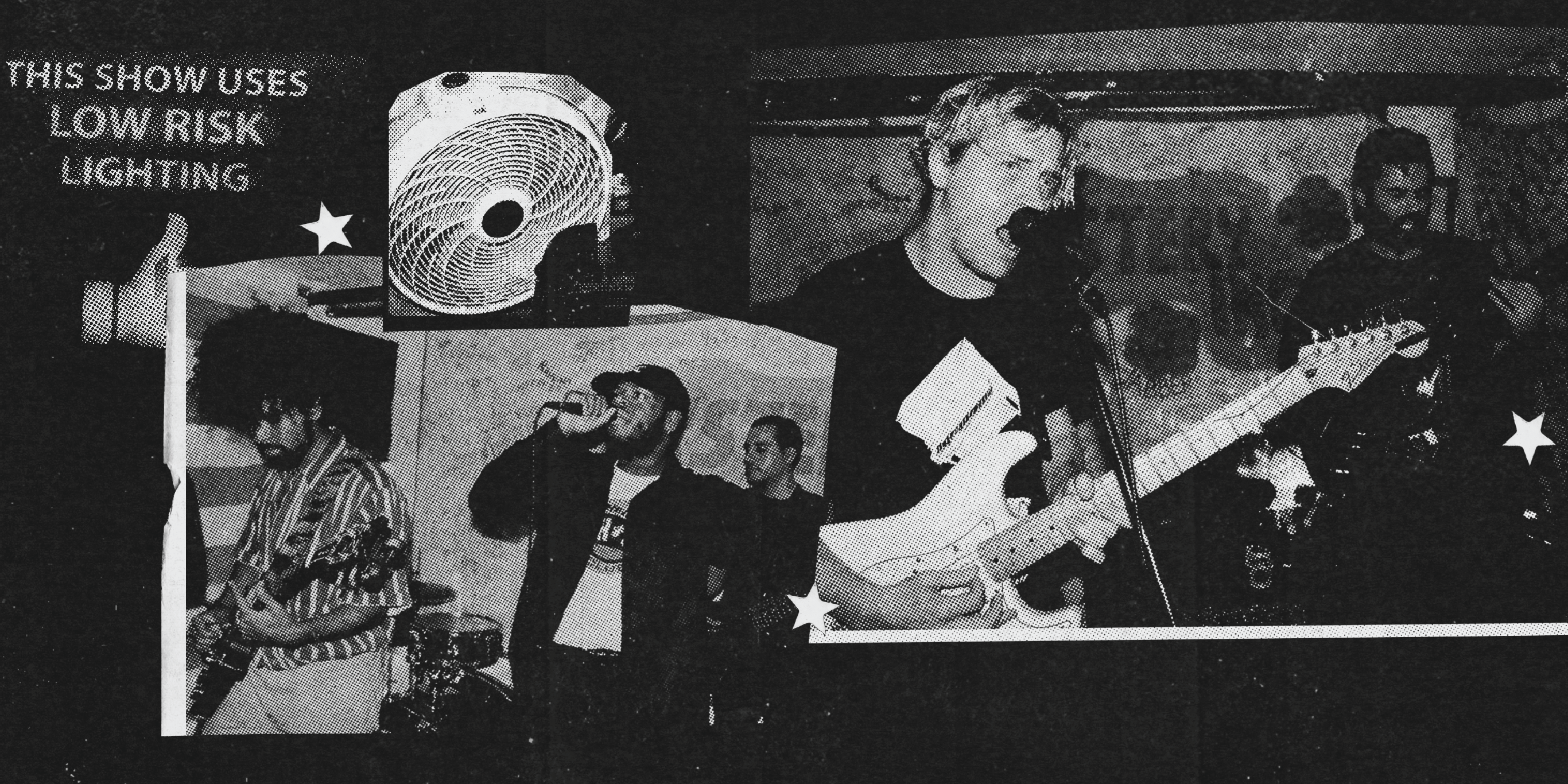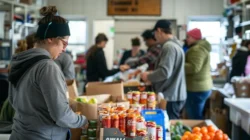A wall of hot air whacks me in the face as I descend the steps into the basement of Mystery Inc. Only string lights illuminate the crowd that has packed the space, standing in every possible corner and sitting on the stairs. Hanging at the bottom of the stairs is an “I Stand With Planned Parenthood” sign. The space is appropriately grimy, with distinct That 70s Show vibes. Nylon balloons hanging on the far wall spell out “R-I-P,” and pool noodles have been duct taped to two floor-to-ceiling poles in the middle of the room.
Right now, the crowd is transfixed by Blair, the first performer of the night. He is an older, slightly balding man wearing sunglasses, and his music is an odd, trancey, robotic monotone, with indistinguishable lyrics. But something about it immediately pulls me in. He performs in front of a banner decorated with the signatures of every band that has played there before. We’re all here for Lumpy Space Collective’s Sept. 27 show, featuring local performers Greenss and Blair, and touring band Flo Petite.
Mystery Inc is a home in the Georgetown area that doubles as a do-it-yourself (DIY) music venue. It’s run by Lumpy Space Collective, a recently established arts collective dedicated to opening its home to local and touring musicians. Since their origins in the 1960s and ’70s, D.C.’s DIY venues have offered a space for musicians and listeners alike to forge an unconventional community built on a desire for artistic autonomy and a love for music. In recent years, house show hosts have focused on developing a more inclusive ethos behind the music.
Rob Cline, one of the founders of Lumpy Space Collective, is a first-year graduate student at George Washington University (GW). I met them a few weeks before the Sept. 27 gig at another Mystery Inc show. They were wearing a pastel t-shirt and exuded an aura of kindness. When a mutual friend introduced us, they immediately said they were glad I was there.
When I interviewed them a few weeks later, their openness remained as we sat on a Mystery Inc couch. Cline was frank about their view of the current state of DIY music. They lamented the oversaturation of the music scene. “There’s a plague of non-serious bands in this world. Like everyone’s in a band, you know what I mean?” they said. “Weeding out the non-serious ones from the serious ones requires just kind of like two-dimensionally screening their social media.”

Cline was first introduced to DIY house shows in high school, when their band Nowadays was invited to play at a local DIY venue. Though Cline describes their sound as “radio indie,” they often found themselves opening for hardcore bands.
As Nowadays played more gigs, Cline befriended touring bands from across the country, forging connections that would help them when they began booking Mystery Inc shows. “I realized that there’s like a social networking aspect to it, in that most of it happens on Facebook,” they said.
Yet, when Cline first moved to D.C., they had trouble connecting to the local DIY scene. “There was nothing my first year, and that was really sad, and it kind of intensified my desire to eventually run my own venue.”
At their college orientation, Cline met Tori Swiacki. A pin on Swiacki’s backpack revealed a mutual love for Connecticut rock band Sorority Noise, though as the band’s frontman has since been accused of sexual assault, they both declared the band “cancelled” when I spoke with them.
When the two began college in the fall of 2016, D.C.’s DIY landscape was sparse.
“The scene was kind of bleak in a sense that like a lot of people did not feel good about having house shows,” Cline said. “And the people who did were super reluctant to meet new people and let them in.”
Part of the reason, Cline believes, is the culture of fear sparked by a 2016 alt-right movement to doxx DIY venues across the country. Following a Dec. 2 fire at an Oakland, California, DIY concert that resulted in the deaths of 36 musicians and audience members, the alt-right took action to shut down DIY venues.
“These places are open hotbeds of liberal radicalism and degeneracy and now YOU can stop them by reporting all such places you may be or may become aware of to the authorities, specifically the local fire marshel [sic],” reads a since-archived 4chan post. “Watch them and follow them to their hives. Infiltrate social circles, go to parties/events, record evidence, and report it. We’ve got them on the run but now we must crush their nests before they can regroup! MAGA my brothers and happy hunting!”
Alt-right activists compiled a list of DIY venues and addresses and called in fire code violations and noise complaints to local authorities. Venues around the country were shut down as a result.
“4chan trolls, like alt-right kind of 4chan trolls were like, ‘Hey, all these northeastern cities have these robust house scenes where anarchists and leftists and gay people all congregate,’ you know what I mean? So everyone they hate is what a DIY show is,” Cline said.
Things changed for Cline and Swiacki when a group of GW students moved into a historic DIY venue near their campus called Above the Bayou, which earned its name from its location above a now out-of-business restaurant called The Bayou. According to Cline, running a DIY venue does not come without its risks.
“Their house got beat to shit and they were still very excited about having people over,” Cline said. “It was the third floor, it was very rickety, they lost a window. It was crazy.”
Observing the wild atmosphere at Above the Bayou shows made Cline and Swiacki reflect on what they would do differently if they had the chance. “The floors were definitely breaking through,” Swiacki said. “The guys who were running it definitely weren’t being the most responsible, and it wasn’t the most inclusive space it could’ve been.”
By the next school year, Cline decided to open a DIY venue at their new apartment at the corner of O Street and Wisconsin Avenue, which they christened Mystery Inc. They aimed to host shows every two weeks, bringing one touring band and two local bands to the space.
They were diligent about managing events responsibly to avoid getting shut down. They employed “tried and true practices,” Cline said, like requesting that people message them for the address in advance so that they have the opportunity to review their accounts first.
“The house was—it was like just a baseline level of grimey, but that’s fine. It was really lived-in, that’s how I would describe it at least,” Swiacki said. “It was fun to live in a gig space, but people really leave beer cans everywhere.”

After Cline graduated, they moved into their current space in the Georgetown area and decided to form an art collective. They came up with the name Lumpy Space Collective after the Adventure Time character Lumpy Space Princess. Becoming a collective mainly allowed them to formalize their organizational processes. They created a Facebook page, set up an email address, and maintain an internal Google Calendar to organize shows.
There are four core organizers: Cline, GW graduate Caroline Corbett, Georgetown junior Egan Barnitt (NHS ’21), and American University student Beth Casey. Because the organizers attend D.C. schools, Lumpy Space shows attract students and residents from across the city.
Initially, Cline relied on the connections they built through Nowadays to book shows. They also used their personal Facebook page to solicit bands in D.C. DIY groups, but the demand quickly made them realize they would need to be deliberate if they wanted to make Mystery Inc as inclusive as possible. “If you don’t go out of your way to find new music, you’re just gonna end up with a bunch of white dudes who make boring indie rock,” they said. “That’s just how it goes because they’re tenacious on Facebook.”
Cline screens bands’ social media, Bandcamp, and Spotify pages. “I’m not gonna lie, if I go on your Spotify and you have like 10,000 listens on a song or something, I’m gonna be a lot more interested in you because it shows that you did something right,” they said.
When screening bands, Cline also places a lot of emphasis on the energy a band can bring to Mystery Inc. “I know tons of people who their music is interesting and good, but it’s not anything out of the ordinary,” they said. “Being really positive energy in the space and just overall being a pleasure to have makes me want to book them more than maybe someone whose music is better.”
Since Lumpy Space’s first show on July 19, Cline estimates they’ve had seven or eight shows and featured nearly 25 bands.
Cline takes the venue’s rules seriously. They make sure to adhere to local noise ordinances, starting on time and winding down all their shows by roughly 10 p.m., and they try to keep people contained inside the house or in the backyard. To absorb sound, they hung blankets on the basement walls, installed sound-absorbing panels, placed a second carpet on top of the basement floor, and covered the windows.
Spencer Green, a Howard University senior who performs under the name Greenss, played at Lumpy Space’s Sept. 27 show. I interviewed him in the side room of Mystery Inc’s basement, sitting on the red floral carpet and looking up at tapestries with the words “Lumpy” and “Corn Dog” painted on them.
Green got connected with Lumpy Space after playing a show at Dwell, another local DIY venue. Cline and Swiacki invited him to play a show at the first Mystery Inc location. From then on, they became close friends.
Since then, Green has performed at three or four Mystery Inc shows. Green’s performances generally feature him playing his music using a sampler while preparing food he can share with the audience. At the Sept. 27 gig, he made rosemary avocado toast.
Green emphasized the unique appeal a venue’s feel holds for those who become regular visitors. For Green, Mystery Inc’s feel is down to the people. “You see the same faces and they just are always very welcoming and make you feel at home. It’s like ‘Oh, let me have a glass of water,’ and they’ll give you like a nice mug. So it’s just kind of that you’re just another part of the family aspect to it.”
I can personally attest to Lumpy Space’s hospitality. After feeling sick all day before covering the Sept. 27 show, I was offered not only a glass of water but also a bed to lie down in while waiting for my SafeRide home.
For Green, house shows foster a unique kind of intimacy. “You feel closer with the artists, with the audience, it’s like we’re all in this together,” Green said. “There’s no real restrictions here besides don’t be a dick, like that’s it you know. I’ll never not appreciate that in a space.”
At Mystery Inc’s new location, Swiacki handles the door and is largely in charge of making sure shows stay safe. “I feel like I have the right balance of mom spirit and like wanting to have fun to do it,” Swiacki said.
“People need to listen to you, but you’re also here to have a good time. And I do have a good time. My friends love to come and hang out with me, and I love meeting people in the space. And I’m just here to make sure it’s a safe time,” Swiacki said.
Lumpy Space Collective and Mystery Inc are just one part of D.C.’s vibrant music scene. Georgetown students more commonly see shows at commercial venues like The Anthem, the 9:30 Club, and U Street Music Hall, where ticket prices can range from $20 to $300. But what concert-goers may not know is that D.C. artists, and artists all over the country, struggle to make a living off their music.
Graham Smith-White, musician and founder of the Fair Trade Music concept, the grassroots organizing methodology for the American Federation of Musicians, has been advocating for D.C. musicians since 2013. Smith-White does not believe D.C. artists are fairly compensated. “Duke Ellington’s first performance was on U Street, and he was paid $100 to do that in 1919,” he said. “To this day, you can still go on U Street and get paid $100 to perform.”
Smith-White attributes part of the problem to the lack of acknowledgement of the exchange of services on both sides. Venues don’t see artists as providing a service for them, and artists don’t either.
“What that does is that creates a sort of pressure,” Smith-White continued, “and that pressure gets released by DIY venues, where people don’t have the overarching commercial goal of some other entity guiding their activities.”
But Sofar Sounds, a company that organizes intimate house shows in cities across the world, shows that the absence of established venues doesn’t necessarily improve working conditions for artists.
Sofar Sounds has been in D.C. for four years, hosting events in coworking spaces, homes, apartment rooftops, and other non-traditional venues. Each show features three artists playing 20-25 minute stripped back or acoustic sets. Sofar Sounds D.C. Director Margot Pien said she strives to book half touring and half local bands. Concert-goers don’t know the location or the lineup in advance.
In cities where Sofar Sounds charges for tickets, such as D.C., they pay artists $100 each, Pien said. “So if it was a solo artist, right now they would receive $100. If it was a five-piece band right now they would receive $100,” Pien said. Sofar Sounds does not compensate hosts for volunteering to share their spaces.
Pien emphasized that artists don’t have to do any promotion for Sofar Sounds shows, as the lineup is kept secret. Sofar Sounds does not take a cut of performers’ merch sales, Pien said, and can sometimes provide artists with photos or social media features.
Musician Adam Schatz published a piece in August on Talkhouse, detailing his experience playing a 2016 Sofar Sounds show and criticizing Sofar Sounds for not compensating artists fairly. Schatz believes that because Sofar Sounds shows basically amount to private parties, artists should be paid more for playing at them. “At that point they’re getting everyone in a room on the value of Sofar Sounds,” Schatz said. “People often leave the shows I think remembering Sofar Sounds and not remembering the band name.”
“If I play a DIY house show and I don’t get paid that much, it’s not the end of the world because I know there’s not money going elsewhere, but at the Sofar shows there is money going elsewhere,” Schatz said.
The average ticket price for a Sofar Sounds D.C. show is $20. The average capacity ranges from 60 to 70 people at each show, and Sofar Sounds puts on about 40 shows in the D.C. area every month. Based on these average numbers, we estimate their monthly revenue to be $52,000. Artists would receive around $12,000 of that, leaving Sofar Sounds D.C. with an additional $40,000 before costs.
But DIY venues don’t have the same protections a large corporation like Sofar Sounds does. When DIY venues become too well-known and successful, Smith-White said, the Department of Consumer and Regulatory Affairs tends to step in and crack down.
“The D.C. government sort of views them as quasi-business entities rather than just a group of human beings with guitars. And that’s caused problems, and they’ve shut down a couple different house concert scenarios where people were so organized that the city was like ‘this is a business, you’re doing everything except paying taxes in our eyes,’” Smith-White said.

D.C. house shows date back to the ’60s and ’70s with the birth of the hardcore punk movement. But Cline has observed an effort to distance the contemporary DIY scene from its past prominent figures, while retaining its original radical values.
“Some of the most famous punk stars from the ’70s and ’80s are like weird dad conservatives now. It’s like maybe punk was always just about being an angry white man, and so there’s definitely been a reckoning with that.”
Through intense collective discussion, Cline has observed a reorientation around the radical Marxist ideals that propelled the original DIY movement along with the establishment of more progressive baseline practices such as an optional door donation and a zero-tolerance policy for abusers and racists.
“But there also is a faction of people who are like ‘no, we have to do it in this very punk, anarchist mindset,’” Cline said. “I would not say that anyone in this house is really an anarchist, but we kind of still try to respect that viewpoint.”
Lumpy Space generally books two local bands and one touring band for each show, and gives 50 percent of door donations to the touring band, and 25 percent to each local band. Sometimes, Cline says, the local bands donate their cut to the touring band, especially if they’re more veteran acts with touring experience.
“The general idea is usually to get more money to the touring band because they have shit to pay for, they’re on tour, they have to buy food, they have to buy gas, they sometimes have to buy lodging,” Cline said.
On top of paying touring bands from the door donation, Lumpy Space opens its home to the travelling artists. “We also let bands just sleep here overnight, just generally use this as a space to take a load off while they’re on tour.”
Additionally, the money collected at the door is not a mandatory cover but rather a donation, because a door fee could open them up to accusations of operating an illegal business.
Swiacki recalls their own experiences on tour with Nowadays as why they believe so vehemently in the importance of a door donation. “We have a lot of talented people come through here and they deserve to get here easily and with dignity, and they deserve to be paid for what they’re doing because you should pay your artists. Absolutely fucking pay your artists,” they said. As Swiacki began speaking, local band Magazine Beach began their set, so their response was punctuated by the band’s driving punk beats.
But Swiacki said they would let you in whether or not you could donate at the door. “If you can’t pay to come out here, I’m going to let you in because you deserve a good time too, you know what I mean? All I ask is that you don’t abuse it,” they said. “If you don’t got anything, bring some art. Bring a good vibe. Bring a beer. Just come hang out and be a good vibe, and if that’s all you have, that’s all you have, and that’s great.”
It’s Oct. 12, homecoming night, and the room is filled with about half Georgetown students. We’ve gathered for that night’s Lumpy Space show, featuring Magazine Beach and touring bands Curtis Cooper and Teenage Halloween. Magazine Beach is jamming out a fast-paced punk tune, and not a single audience member is on their phones.
A mosh pit forms, and by that I mean three or four dudes start shoving each other aggressively, and now I know what the pool noodles taped to the poles are for. It feels like catharsis, an untouchable release, sweat and smiling faces. It’s not long before I become a casualty of the mosh pit, but I almost don’t even care. The music is infectious, and I start to dance.
Image Credits: Jacob Bilich, Caroline Corbett, and Tori Swiacki
Editor’s Note: This piece has been updated to reflect the fact that Sofar Sounds’ monthly revenue is $40,000 before costs.






